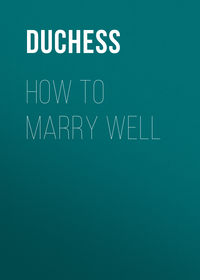 полная версия
полная версияFaith and Unfaith: A Novel
"Indeed I have."
"Well, I think I know some who will just suit you. She was at school with me, and, though poor now, having lost both father and mother, is of very good family, and well connected."
"But the salary?" says Mrs. Redmond, with some hesitation. "The salary is the thing. I hear of no one now who will come for less than sixty or seventy pounds a year at the lowest; and with Henry at school, and Rupert's college expenses, forty pounds is as much as we can afford to give."
"Miss Broughton will, I think, be quite content with that: she only wants to be happy, and at rest, and she will be all that with you and Cissy and Mr. Redmond. She is young, and it is her first trial, but she is very clever: she has a really lovely voice, and paints excessively well. Ethel has rather a taste for painting, has she not?"
"A decided talent for it. All my family were remarkable for their artistic tendencies, so she, doubtless, inherits it; and – yes, of course, it would be a great thing for her to have some one on the spot to develop this talent, and train it. Your friend, you say, is well connected?"
"Very highly connected, on her mother's side. Her father was a lieutenant in the navy, and very respectable too, I believe; though I know nothing of him."
"That she should be a lady is, of course, indispensable," says Mrs. Redmond, with all the pride that ought to belong to softgoods people. "I need hardly say that, I think. But why does she not appeal for help to her mother's relations?"
"Because she prefers honest work to begging from those who up to this have taken no notice of her."
"I admire her," says Mrs. Redmond, warmly. "If you think she will be satisfied with forty pounds, I should like to try what she could do with the children."
"I am very glad you have so decided. I know no place in which I would rather see a friend of mine than here."
"Thank you, my dear. Then will you write to her, or shall I?"
"Let me write to her first, if you don't mind: I think I can settle everything."
"Mind? – no, indeed: it is only too good of you to take so much trouble about me."
To which Clarissa says, prettily, —
"Do not put it in that light: there is no pleasure so keen as that of being able to help one's friends."
Then she rises, and, having left behind her three socks that no earthly power can ever again draw upon a child's foot, so hopelessly has she brought heel and sole together, she says good-by to Mrs. Redmond, and leaves the room.
Outside on the avenue she encounters the vicar, hurrying home.
"Turn with me," she says, putting her hand through his arm. "I have something to say to you."
"Going to be married?" asks he, gayly.
"Nonsense!" – blushing, in that he has so closely hit the mark. "It is not of anything so paltry I would unburden my mind."
"Then you have nothing of importance to tell me," says the vicar; "and I must go. Your story will keep: my work will not. I am in a great hurry: old Betty Martin – "
"Must wait. I insist on it. Dying! nonsense! she has been dying every week for three years, and you believe her every time. Come as far as the gate with me."
"You command, I obey," says the vicar, with a sigh of resignation, walking on beside his pet parishioner. "But if you could only understand the trouble I am in with those Batesons you would know some pity for me."
"What! again?" says Clarissa, showing, and feeling, deep compassion.
"Even so. This time about the bread. You know what unpleasant bread they bake, and how Mrs. Redmond objects to it; and really it is bad for the children."
"It is poison," says Clarissa, who never does anything by halves, and who is nothing if not sympathetic.
"Well so I said; and when I had expostulated with them, mildly but firmly, and suggested that better flour might make better dough, and they had declined to take any notice of my protest, – why, I just ordered my bread from the Burtons opposite, and – "
The vicar pauses.
"And you have been happy ever since?"
"Well, yes, my dear. I suppose in a way I have; that is, I have ceased to miss the inevitable breakfast-lecture on the darkness and coarseness of the bread; but I have hardly gained on other points, and the Batesons are a perpetual scourge. They have decided on never again 'darkening the church door' (their own words, my dear Clarissa), because I have taken the vicarage custom from them. They prefer imperilling their souls to giving up the chance of punishing me. And now the question is, whether I should not consent to the slow poisoning of my children, rather than drive my parishioners into the arms of the Methodists, who keep open house for all comers below the hill."
"I don't think I should poison the children," says Clarissa.
"But what is to become of my choir? Charlotte Bateson has the sweetest voice in it, and now she will not come to church. I am at my wits' end when I think of it all."
"I am going to supply Charlotte's place for you," says Clarissa, slyly.
"Thank you, my dear. But, you see, you would never be in time. And, unfortunately, the services must begin always at a regular hour. Punctuality was the one thing I never could teach you, – that, and the Catechism."
"What a libel!" says Clarissa. "I shouldn't malign my own teaching if I were you. I am perfectly certain I could say it all now, this very moment, from start to finish, questions and all, without a mistake. Shall I?"
"No, no. I'll take your word for it," says the vicar, hastily. "The fact is, I have just been listening to it at the morning school in the village, and when one has heard a thing repeated fourteen times with variations, one naturally is not ambitious of hearing it again, no matter how profitable it may be."
"When I spoke of filling Charlotte's place," says Clarissa, "I did not allude in any way to myself, but to – And now I am coming to my news."
"So glad!" says the vicar; "I may overtake old Betty yet."
"I have secured a governess for Mrs. Redmond. Such a dear little governess! And I want you to promise me to be more than usually kind to her, because she is young and friendless and it is her first effort at teaching."
"So that question is settled at last," says the vicar, with a deep – if carefully suppressed – sigh of relief. "I am rejoiced, if only for my wife's sake, who has been worrying herself for weeks past, trying to replace the inestimable – if somewhat depressing – Miss Prood."
"Has she?" says Clarissa, kindly. "Worry is a bad thing. But to-day Mrs. Redmond seems much better than she has been for a long time. Indeed, she said so."
"Did she?" says the vicar, with a comical, transient smile, Mrs. Redmond's maladies being of the purely imaginary order.
"What are you laughing at now?" asks Clarissa, who has marked this passing gleam of amusement.
"At you, my dear, you are so quaintly humorous," replies he. "But go on: tell me of this new acquisition to our household. Is she a friend of yours?"
"Yes, a great friend."
"Then of course we shall like her."
"Thank you," says Clarissa. "She is very pretty, and very charming. Perhaps, after all, I am doing a foolish thing for myself. How shall I feel when she has cut me out at the vicarage?"
"Not much fear of that, were she Aphrodite herself. You are much too good a child to be liked lightly or by halves. Well, good-by: you won't forget about the flannel for the Batley twins?"
"I have it ready, – at least, half of it. How could I tell she was going to have twins," says Clarissa, apologetically.
"It certainly was very inconsiderate of her," says the vicar, with a sigh, as he thinks of the poverty that clings to the Batley ménage from year's end to year's end.
"Well, never mind; she shall have it all next week," promises Clarissa, soothingly, marking his regretful tone; and then she bids him farewell, and goes up the road again in the direction of her home.
She is glad to be alone at last. Her mission successfully accomplished, she has now time to let her heart rest contentedly upon her own happiness. All the events of the morning – the smallest word, the lightest intonation, the most passing smile, that claimed Horace as their father – are remembered by her. She dwells fondly on each separate remembrance, and repeats to herself how he looked and spoke at such-and-such moments.
She is happy, quite happy. A sort of wonder, too, mixes with her delight. Only a few short hours ago she had left her home, free, unbetrothed, with only hope to sustain her, and now she is returning to it with her hope a certainty, – bound, heart and soul, to the dearest, truest man on earth, as she believes.
How well he loves her! She had noticed his sudden paling when she had begged for some delay before actually naming her "brydale day." She had hardly believed his love for her was so strong, so earnest: even she (how could she? with tender self-reproach) had misjudged him, had deemed him somewhat cold, indifferent; unknowing of the deep stratum of feeling that lay beneath the outward calm of his demeanor.
Dear, dearest Horace! She will never disbelieve in him again; he is her own now, her very own, and she loves him with all her heart, and he loves just the same, and – Oh, if every woman in the world could only be as happy as she is to-day, what a glorious place it would be!
Not that it is such a bad place, by any means, as some people would lead one to imagine. Surely these are disagreeable people, misanthropists, misogamists, and such like heretics; or else, poor souls! they are in a bad strait, without present hope and without any one to love them! This last seems, indeed, a misfortune.
Yet why abuse a lovely world? How bright the day is, how sweet and fresh the air, though evening is nigh at hand! She hardly ever remembers a September so fine, So free from damp; the very birds —
Had he thought her unloving or capricious when she pleaded for a longer engagement? (Here the tears rise unbidden in her eyes.) Oh, surely not; he understood her thoroughly; for had he not smiled upon her afterwards?
So he will always smile. There shall never be any cross words or angry frowns to chill their perfect love! Their lives will be a summer dream, a golden legend, a pure, fond idyl.
Thus beguiling time with beliefs too sweet for earthly power to grant, she hastens home, with each step building up another story in her airy house, until at length she carries a castle, tall and stately, into her father's house.
CHAPTER X
"I have no other but a woman's reason:
I think him so, because I think him so." – Shakespeare.
"Where is papa?" she asks, meeting one of the servants in the hall. Hearing he is out, and will not be back for some time, she, too, turns again to the open door, and, as though the house is too small to contain all the thoughts that throng her breast, she walks out into the air again, and passes into the garden, where autumn, though kindly and slow in its advances, is touching everything with the hand of death.
"Heavily hangs the broad sunflowerOver its grave i' the earth so chilly;Heavily hangs the hollyhock,Heavily hangs the tiger lily."With a sigh she quits her beloved garden, and wanders still! farther abroad into the deep woods that "have put their glory on," and are dressed in tender russets, and sad greens, and fading tints, that meet and melt into each other.
The dry leaves are falling, and lie crackling under foot. The daylight is fading, softly, imperceptibly, but surely. There is yet a glow from the departing sunlight, that, sinking lazily beyond the distant hills, tinges with gold the browning earth that in her shroud of leaves is lying.
But death, or pain, or sorrow, has no part with Clarissa to-day. She is quite happy, – utterly content. She marks not the dying of the year, but rather the beauty of the sunset. She heeds not the sullen roar of the ever-increasing streamlets, that winter will swell into small but angry rivers; hearing only the songs of the sleepy birds as they croon their night-songs in the boughs above her.
When an hour has passed, and twilight has come up and darkened all the land, she goes back again to her home, and, reaching the library, looks in, to find her father sitting there, engrossed as usual with some book, which he is carefully annotating as he reads.
"Are you very busy?" asks she, coming slowly up to him. "I want to be with you for a little while."
"That is right. I am never too busy to talk to you. Why, it is quite an age since last I saw you! – not since breakfast; where have you been all day?"
"You are a pet," says Miss Peyton, in a loving whisper, rubbing her cheek tenderly against his, as a reward for his pretty speech. "I have been at the vicarage, and have pleaded Georgie's cause so successfully that I have won it; and have made them half in love with her already."
"A special pleader indeed. Diplomacy is your forte: you should keep to it."
"I mean to. I shouldn't plead in vain with you, should I?" She has grown somewhat earnest.
"Oh! with me!" says her father, with much self-contempt; "I have given up all that sort of thing, long ago. I know how much too much you are for me, and I am too wise to swim against the tide. Only I would entreat you to be merciful as you are strong."
"What a lot of nonsense you do talk, you silly boy!" says Clarissa, who is still leaning over his chair in such a position that he cannot see her face. Perhaps, could he have seen it, he might have noticed how pale it is beyond its wont. "Well, the Redmonds seemed quite pleased, and I shall write to Georgie to-morrow. It will be nice for her to be here, near me. It may keep her from being lonely and unhappy."
"Well, it ought," says George Peyton. "What did the vicar say?"
"The vicar always says just what I say," replies she, a trifle saucily, and with a quick smile.
"Poor man! his is the common lot," says her father; and then, believing she has said all she wants to say, and being filled with a desire to return to his book and his notes, he goes on: "So that was the weighty matter you wanted to discuss, eh? Is that all your news?"
"Not quite," returns she, in a low tone.
"No? You are rich in conversation this evening. Who is it we are now to criticise?"
"The person you love best, – I hope."
"Why, that will be you," says George Peyton.
"You are sure?" says Clarissa, a little tremulously; and then her father turns in his chair and tries to read her face.
"No; stay just as you are; I can tell you better if you do not look at me," she whispers, entreatingly, moving him with her hands back to his former position.
"What is it, Clarissa?" he asks, hastily, though he is far from suspecting the truth. Some faint thought of James Scrope (why he knows not) comes to him at this moment, and not unpleasingly. "Tell me, darling. Anything that concerns you must, of necessity, concern me also."
"Yes, I am glad I know that," she says, speaking with some difficulty, but very earnestly. "To-day I met Horace Branscombe."
"Yes?" His face changes a little, from vague expectancy to distinct disappointment; but then she cannot see his face.
"And he asked me to be his wife – and – I said, Yes – if – if it pleases you, papa."
It is over. The dreaded announcement is made. The words that have cost her so much to utter have gone out into the air; and yet there is no answer!
For a full minute silence reigns, and then Clarissa lays her hand imploringly upon her father's shoulder. He is looking straight before him, his expression troubled and grave, his mouth compressed.
"Speak to me," says Clarissa, entreatingly.
After this he does speak.
"I wish it had been Dorian," he says, impulsively.
Then she takes her hand from his shoulder, as though it can no longer rest there in comfort, and her eyes fill with disappointed tears.
"Why do you say that?" she asks, with some vehemence. "It sounds as if – as if you undervalued Horace! Yet what reason have you for doing so? What do you know against him?"
"Nothing, literally nothing," answers Mr. Peyton, soothingly, yet with a plaintive ring in his voice that might suggest the idea of his being sorry that such answer must be made. "I am sure Horace is very much to be liked."
"How you say that!" – reproachfully. "It sounds untrue! Yet it can't be. What could any one say against Horace?"
"My dear, I said nothing."
"No, but you insinuated it. You said Dorian was his superior."
"Well, I think he is the better man of the two," said Mr. Peyton, desperately, hardly knowing what to say, and feeling sorely aggrieved in that he is compelled to say what must hurt her.
"I cannot understand you; you said you know nothing prejudicial to Horace (it is impossible you should), and yet you think Dorian the better man. If he has done no wrong, why should any one be a better man? Why draw the comparison at all? For the first time in all your life, you are unjust."
"No, Clarissa, I am not. At least, I think not. Injustice is a vile thing. But, somehow, Sartoris and I had both made up our minds that you would marry Dorian, and – "
He pauses.
"Then your only objection to poor Horace is that he is not Dorian?" asks she, anxiously, letting her hand once more rest upon his shoulder.
"Well, no doubt there is a great deal in that," returns he, evasively, hard put to it to answer his inquisitor with discretion.
"And if Dorian had never been, Horace would be the one person in all the world you would desire for me?" pursues she, earnestly.
George Peyton makes no reply to this, – perhaps because he has not one ready. Clarissa, stepping back, draws her breath a little quickly, and a dark fire kindles in her eyes. In her eyes, too, large tears rise and shine.
"It is because he is poor," she says, in a low tone, that has some contempt in it, and some passionate disappointment.
"Do not mistake me," says her father, speaking hastily, but with dignity. Rising, he pushes back his chair, and turning, faces her in the gathering twilight. "Were he the poorest man alive, and you loved him, and he was worthy of you, I would give you to him without a murmur. Not that" – hurriedly – "I consider Horace unworthy of you, but the idea is new, strange, and – the other day, Clarissa, you were a child."
"I am your child still, – always." She is sitting on his knee now, with her arms round his neck, and her cheek against his; and he is holding her svelte lissome figure very closely to him. She is the one thing he has to love on earth; and just now she seems unspeakably – almost painfully – dear to him.
"Always, my dear," he reiterates, somewhat unsteadily.
"You have seen so little of Horace lately," she goes on, presently, trying to find some comfortable reason for what seems to her her father's extraordinary blindness to her lover's virtues. "When you see a great deal of him, you will love him! As it is, darling, do —do say you like him very much, or you will break my heart!"
"I like him very much," replies he, obediently, repeating his lesson methodically, while feeling all the time that he is being compelled to say something against his will, without exactly knowing why he should feel so.
"And you are quite pleased that I am going to marry him?" reading his face with her clear eyes; she is very pale, and strangely nervous.
"My darling, my one thought is for your happiness." There is evasion mixed with the affection in this speech; and Clarissa notices it.
"No: say you are glad I am going to marry him," she says, remorselessly.
"How can you expect me to say that," exclaims he, mournfully, "when you know your wedding-day must part us?"
"Indeed it never shall!" cries she, vehemently; and then, overcome by the emotion of the past hour, and indeed of the whole day, she gives way and bursts into tears. "Papa, how can you say that? To be parted from you! We must be the same to each other always: my wedding-day would be a miserable one indeed if it separated me from you."
Then he comforts her, fondly caressing the pretty brown head that lies upon his heart, as it had lain in past years, when the slender girl of to-day was a little lisping motherless child. He calls her by all the endearing names he had used to her then, until her sobs cease, and only a sigh, now and again, tells of the storm just past.
"When is it to be?" he asks her, after a little while. "Not too soon, my pet, I hope?"
"Not for a whole year. He said something about November, but I could not leave you in such a hurry. We must have one more Christmas all to ourselves."
"You thought of that," he says, tenderly. "Oh, Clarissa, I hope this thing is for your good. Think of it seriously, earnestly, while you have time. Do not rush blindly into a compact that must be binding on you all your life."
"I hope it will be for all my life," returns she, gravely. "To be parted from Horace would be the worst thing that could befall me. Always remember that, papa. I am bound to him with all my heart and soul."
"So be it!" says George Peyton, solemnly. A sigh escapes him.
For some time neither speaks. The twilight is giving place to deeper gloom, the night is fast approaching, yet they do not stir. What the girl's thoughts may be at this moment, who can say? As for her father, he is motionless, except that his lips move, though no sound comes from them. He is secretly praying, perhaps, for the welfare of his only child, to her mother in heaven, who at this time must surely be looking down upon her with tenderest solicitude. Clarissa puts her lips softly to his cheek.
"Our engagement will be such a long one, that we think – "
"Yes?"
"We should like it keep it secret. You will say nothing about it to any one?"
"Not until you give me leave. You have acted wisely, I think, in putting off your marriage for a while." Almost unconsciously he is telling himself how time changes all things, and how many plans and affections can be altered in twelve months.
"But surely you will tell James Scrope," he goes on, after a while: "that will not be making it public. He has known you and been fond of you ever since you were a baby; and it seems uncivil and unfriendly to keep him in the dark."
"Then tell him; but no one else now, papa. I quite arranged for James, he is such an old friend, and so nice in every way."
Here she smiles involuntarily, and, after a little bit, laughs outright, in spite of herself, as though at some ridiculous recollection.
"Do you know," she says, "when I told Horace I thought I should like Sir James to know of our engagement, I really think he felt a little jealous! At least, he didn't half like it. How absurd! – wasn't it? Fancy being jealous of dear old Jim?"
"Old! – old! He is a long way off that. Why, all you silly little girls think a man past twenty-nine to be hovering on the brink of the grave. He can not be more than thirty-three, or so."
"He is very dreadfully old, for all that," says Miss Peyton, wilfully. "He is positively ancient; I never knew any one so old. He is so profound, and earnest, and serious, and – "
"What on earth has he done to you, that you should call him all these terrible names?" says Mr. Peyton, laughing.
"He scolds me," says Clarissa, "he lectures me, and tells me I should have an aim in life. You have been my aim, darling, and I have been very devoted to it, haven't I?"
"You have, indeed. But now I shall be out in the cold, of course." His tone is somewhat wistful. "That is all one gains by lavishing one's affection upon a pretty child and centring one's every thought and hope upon her."
"No, you are wrong there; it must be something to gain love that will last for ever." She tightens her arm around his neck. "What a horrid little speech! I could almost fancy James dictated it to you. He is a sceptic, an unbeliever, and you have imbibed his notions. Cynical people are a bore. You wouldn't, for example, have me fall in love with James, would you?"
"Indeed I would," says George Peyton, boldly. "He is just the one man I would choose for you, – 'not Launcelot, nor another.' He is so genuine, so thorough in every way. And then the estates join, and that. I really wish you had fallen in love with Scrope."
"I love you dearly, – dearly," says Miss Peyton; "but you are a dreadful goose! James is the very last man to grow sentimental about any one, – least of all, me. He thinks me of no account at all, and tells me so in very polite language occasionally. So you see what a fatal thing it would have been if I had given my heart to him. He would have broken it, and I should have died, and you would have put up a touching, and elaborate tablet to my memory, and somebody would have planted snowdrops on my grave. There would have been a tragedy in Pullingham, with Jim for its hero."









